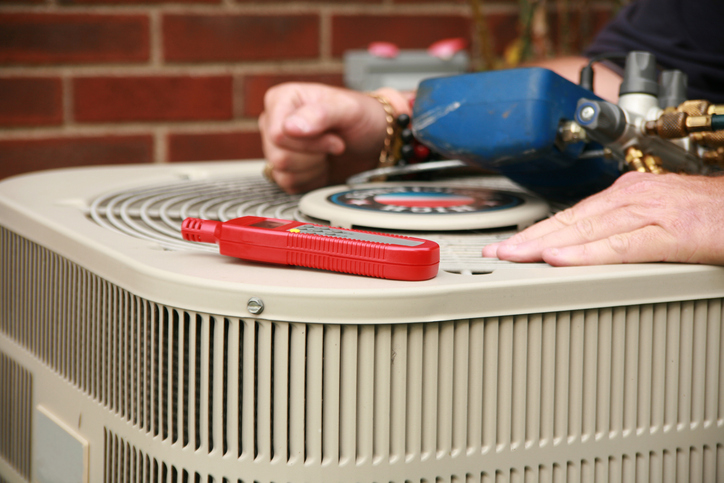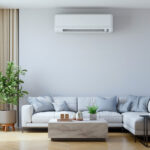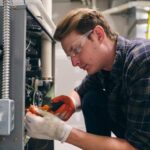
How to Fix an Overheated Air Conditioner
Even as November rolls in, Arizona’s daytime temperatures can remain uncomfortably high, making a well-functioning air conditioner essential for home comfort. However, after months of heavy summer use, your AC may not perform as efficiently as before. One common issue homeowners face is an overheated air conditioner – a problem that can lead to system breakdowns, reduced cooling efficiency, and even safety hazards.
It may be overheating if your AC has been running longer than usual, frequently tripping the circuit breaker, or blowing warm air instead of cool. Understanding why this happens and knowing how to fix an overheated air conditioner can help you avoid costly repairs and ensure your home stays comfortable.
What Happens When an Air Conditioner Overheats?
Your air conditioner is designed to regulate indoor temperatures by absorbing heat from inside your home and releasing it outdoors. This process involves key components such as the compressor, condenser coils, and fan motor, all working together to remove heat.
When an AC unit is overworked or lacks proper airflow, its internal temperature rises. If the system can’t cool itself effectively, overheating occurs. This can cause several issues, including:
- Circuit Breaker Trips: Overheating often leads to electrical overloads, causing your breaker to shut off power as a safety measure.
- Compressor Failure: The compressor pumps refrigerant through the system. If it overheats, it may fail, leading to costly repairs.
- Burnt-Out Capacitor: The capacitor helps start the motor that powers the system. Excess heat can damage this component, preventing your AC from running.
- Fan Motor Damage: If the fan motor overheats, it won’t expel hot air properly, worsening the problem.
If you suspect your air conditioner is overheating, it’s crucial to act fast. Below, we’ll explore the most common causes of overheating and how to fix an overheated air conditioner before it leads to a complete system failure.
Why Is My Air Conditioner Overheating?
Several factors can cause an air conditioner to overheat. Identifying the root cause is the first step in resolving the issue.
1. Clogged or Dirty Air Filter
A dirty air filter restricts airflow, making your AC work harder than necessary. Over time, dust, pet hair, and debris can build up in the filter, reducing efficiency and increasing strain on the system. This not only leads to overheating but also raises energy costs.
Solution: Check and replace your air filter every one to three months, especially during peak cooling seasons. If you have pets or live in a dusty environment, you may need to replace it more frequently.
2. Low Refrigerant Levels
Refrigerant is essential for absorbing and transferring heat. If your AC is low on refrigerant due to a leak, it won’t remove heat efficiently, causing the system to overwork and overheat. Signs of low refrigerant include weak cooling performance, ice buildup on the coils, and hissing sounds from the unit.
Solution: If you suspect a refrigerant leak, contact an HVAC professional. Refrigerant handling requires special certification, and simply refilling the coolant won’t fix the underlying leak.
3. Dirty Condenser or Evaporator Coils
Condenser coils, located in the outdoor unit, release heat from the AC system. Heat transfer becomes inefficient when they are covered in dirt and debris, causing the system to overheat. Similarly, dirty evaporator coils can lead to reduced cooling capacity.
Solution: Clean the condenser coils at least twice a year. Use a coil cleaner spray or a soft brush to remove debris. Keeping the area around your outdoor unit clear of leaves, grass, and dirt can also improve airflow.
4. Blocked or Restricted Airflow
Proper airflow is crucial for your AC to function correctly. Blocked vents, closed registers, or furniture obstructing airflow can cause uneven cooling and force the system to work harder.
Solution: Ensure that all vents are open and unblocked. If you notice weak airflow, have an HVAC technician inspect your ductwork for blockages or leaks.
5. Faulty Fan Motor
The fan motor helps expel heat from your AC system. If it fails, hot air remains trapped inside, leading to overheating. Unusual noises, such as rattling or grinding, can indicate a failing fan motor.
Solution: If you suspect a fan motor issue, schedule a professional inspection. In some cases, the motor may need lubrication or minor repairs, but if it’s severely damaged, replacement may be necessary.
6. Electrical Issues
Loose wiring, faulty capacitors, or an aging electrical system can lead to overheating. If your AC frequently trips the circuit breaker, this may be a sign of an underlying electrical issue.
Solution: Electrical repairs should be handled by a licensed HVAC technician. If you notice frequent power issues, avoid resetting the breaker repeatedly, as this can lead to further damage.
7. Lack of Routine Maintenance
Skipping regular maintenance increases the likelihood of system failures, including overheating. An annual tune-up helps identify potential issues before they escalate.
Solution: Schedule annual AC maintenance with a professional HVAC technician to ensure optimal performance and prevent overheating.
How Do I Know If My Air Conditioner Is Overheating?
Recognizing the warning signs of an overheating AC can help prevent serious damage. Here are some common indicators:
- A burning or smoky smell coming from the vents
- A buzzing or rattling noise from the unit
- The unit shuts off unexpectedly
- Warm air blowing from the vents instead of cool air
- The area around the outdoor unit feels excessively hot
- Higher-than-usual energy bills
- Frequent circuit breaker trips
If you notice any of these signs, it’s time to take action. Addressing the issue early can save you from expensive repairs and ensure your AC continues to operate efficiently.
How to Fix an Overheated Air Conditioner: Tips
Now that you understand the causes and warning signs of an overheating AC, let’s go over how to fix an overheated air conditioner step by step:
- Turn off the AC: Prevent further damage by shutting off the unit at the thermostat and circuit breaker.
- Check and Replace the Air Filter: A clean filter can improve airflow and prevent overheating.
- Inspect the Outdoor Unit: Clear any debris, leaves, or dirt around the condenser to ensure proper airflow.
- Check for Ice Buildup: If ice is present, let it melt completely before restarting the system.
- Reset the Circuit Breaker: If your AC tripped the breaker, reset it after addressing potential causes.
- Monitor the Unit After Restarting: If overheating persists, schedule an HVAC inspection.
When to Call a Professional?
If your AC continues to overheat despite performing basic troubleshooting, it’s time to call in a professional. An HVAC expert can diagnose complex issues, repair or replace faulty components, and ensure your system is running efficiently.
At McMillin Air, we understand how to fix an overheated air conditioner quickly and effectively. Our experienced technicians provide honest, reliable service to keep your AC in top shape, even during Arizona’s hottest months.
If you’re experiencing AC issues, don’t wait until it’s too late. McMillin Air offers expert diagnostics, repairs, and maintenance services to prevent overheating and keep your home cool. Contact us today to schedule an appointment and get your AC back on track!








0 comments